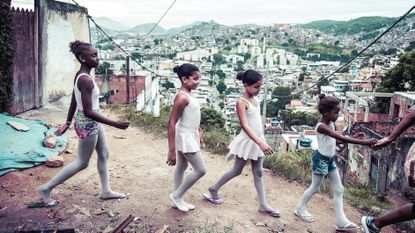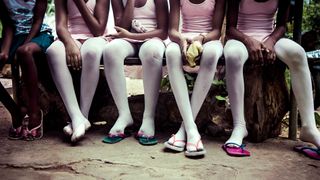
Brazilians turn wide-eyed when you tell them you've visited the Complexo do Alemão favelas in Rio de Janeiro. They know the low-income community, home to 60,000 residents, from evening news broadcasts that show drug traffickers with assault rifles and mothers shouting "Cowards!" when their children are struck by stray bullets in shoot-outs between the police and dealers.
In a quieter section of the neighborhood, Tuany Nascimento, 22, stretches on the scuffed-up blue floor of an open-air sports ring where she went to practice ballet even after she'd given up the dream of becoming a professional. "I would come alone," says Nascimento, "and always a girl or two would show up to learn what I was doing."

So she started Na Ponta dos Pés (On Our Tiptoes) in 2013, teaching three ballet classes twice a week to nearly 50 girls, ages 4 to 17, in that same sports court, where students in dirty white ballet slippers now skirt around pools of water from yesterday's rainfall.
It's a bare-bones operation: The ballet barre was nabbed from an out-of-use dance studio, and the program's only financial support has come from a small grant from a chain furniture store. The fee? Students need only bring their report cards to prove they're enrolled in school and passing all their classes.
Classical ballet is one of the art forms that most transforms a person.
"Classical ballet is one of the art forms that most transforms a person," says Nascimento, who is studying physical education at Celso Lisboa college. "Once you are here, you have rules, you have discipline, you have challenges—all are things that you are going to find in your life. I will not have 49 ballerinas. If I have one, marvelous! But let's have 49 girls who have an educated mind and are looking for a better future, where they know they have options. The majority think: I'm going to get a job near my home, then I'll be a mother. They don't leave the walls of the community. I want to show them that the world is large and that there's a chance for everybody."

It's also a chance to show the police that the favelas are full of working families who have ambitions separate from drug traffickers. "It doesn't help much if you come here and swap the weapons the traffickers have for the weapons the police have," says Nascimento. "I think you could swap a weapon for a boxing glove, a weapon for a computer, a weapon for a ballet slipper."
For more information, visit balletnapontadospes.weebly.com.
Stay In The Know
Marie Claire email subscribers get intel on fashion and beauty trends, hot-off-the-press celebrity news, and more. Sign up here.
This article appears in the May issue of Marie Claire, on newsstands now.
-
 Olivia Rodrigo Finds the Perfect Spring Dresses at Reformation
Olivia Rodrigo Finds the Perfect Spring Dresses at ReformationShe's worn the brand twice in the past week.
By Julia Marzovilla Published
-
 Curiously, Just as Meghan Markle Sends Samples of Her New Strawberry Jam Out, the Buckingham Palace Shop Starts Promoting Its Own Strawberry Jam on Social Media
Curiously, Just as Meghan Markle Sends Samples of Her New Strawberry Jam Out, the Buckingham Palace Shop Starts Promoting Its Own Strawberry Jam on Social MediaThe clip promoting the Buckingham Palace Shop’s product—we cannot make this up—is set to Mozart’s “Dissonance Quartet.”
By Rachel Burchfield Published
-
 Zendaya's Latest 'Challengers' Serve Is Nearly a Century Old
Zendaya's Latest 'Challengers' Serve Is Nearly a Century OldThe 1930s-era dress may have been pulled months ago.
By Halie LeSavage Published
-
 The Best Bollywood Movies of 2023 (So Far)
The Best Bollywood Movies of 2023 (So Far)Including one that just might fill the Riverdale-shaped hole in your heart.
By Andrea Park Published
-
 ‘Bachelor in Paradise’ 2023: Everything We Know
‘Bachelor in Paradise’ 2023: Everything We KnowCue up Mike Reno and Ann Wilson’s “Almost Paradise."
By Andrea Park Last updated
-
 Who Is Gerry Turner, the ‘Golden Bachelor’?
Who Is Gerry Turner, the ‘Golden Bachelor’?The Indiana native is the first senior citizen to join Bachelor Nation.
By Andrea Park Last updated
-
 ‘Virgin River’ Season 6: Everything We Know
‘Virgin River’ Season 6: Everything We KnowHere's everything we know on the upcoming episodes.
By Andrea Park Last updated
-
 The 60 Best Musical Movies of All Time
The 60 Best Musical Movies of All TimeAll the dance numbers! All the show tunes!
By Amanda Mitchell Last updated
-
 'Ginny & Georgia' Season 2: Everything We Know
'Ginny & Georgia' Season 2: Everything We KnowNetflix owes us answers after that ending.
By Zoe Guy Last updated
-
 35 Nude Movies With Porn-Level Nudity
35 Nude Movies With Porn-Level NudityLots of steamy nudity ahead.
By Kayleigh Roberts Last updated
-
 The Cast of 'The Crown' Season 5: Your Guide
The Cast of 'The Crown' Season 5: Your GuideThe Mountbatten-Windsors have been recast—again.
By Andrea Park Published